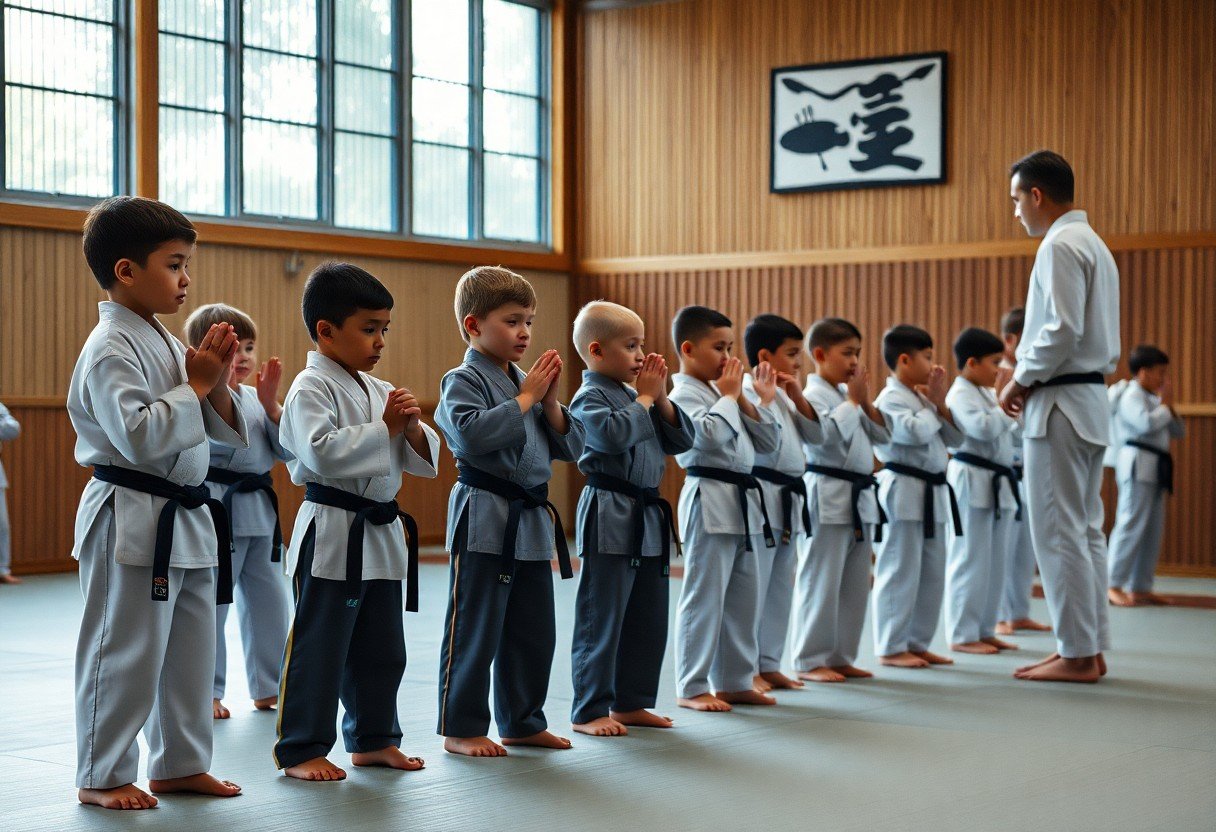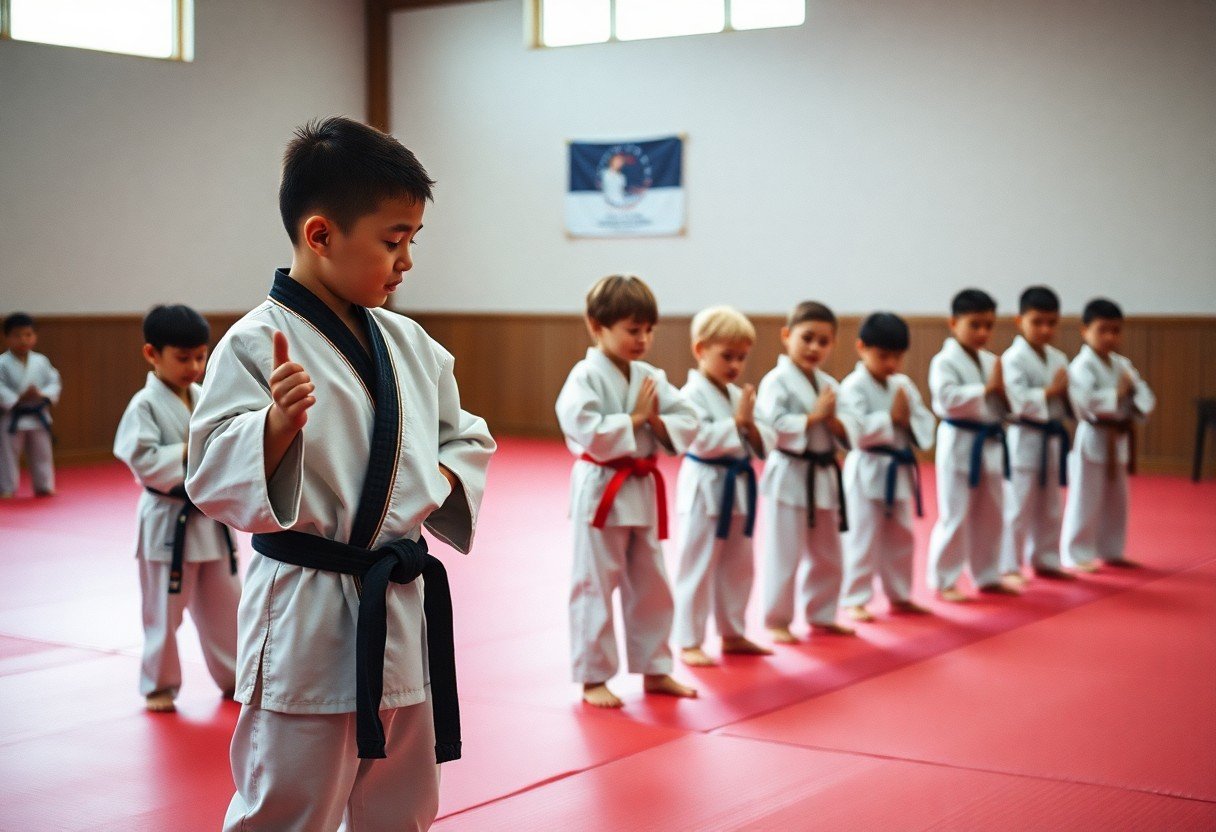Children who practise martial arts not only learn vital physical skills but also the invaluable lesson of respect for themselves and others. This fundamental aspect of training fosters a sense of discipline and self-control, shaping their character both on and off the mat. By understanding the importance of respect, you empower your child to cultivate positive relationships with peers and instructors, creating a harmonious training environment. Ultimately, teaching your child respect through martial arts can lead to lifelong benefits in all areas of their life.
Understanding Respect in Martial Arts
To truly grasp the concept of respect within martial arts, it is crucial to comprehend its fundamental role in shaping not only a student’s skills but also their character. Respect creates a safe and supportive environment where children can learn, grow, and build camaraderie with their peers. Through understanding, you cultivate discipline, humility, and mutual appreciation, which are vital components for success both on and off the mat.
Definition of Respect
Respect is an acknowledgement of the value of others and oneself, fostering admiration and courtesy in interactions. In martial arts, it encompasses respect for instructors, peers, and the traditions and philosophies that underpin the discipline. This profound appreciation creates a positive atmosphere for growth and learning.
Historical Context
Along with its importance in modern practice, respect has deep-rooted significance in the history of martial arts. Ancient traditions often encompassed rituals and protocols woven into the fabric of training, emphasising the need to respect one’s teacher and fellow practitioners. This cultural backdrop has instilled a sense of honour and responsibility, which remains vital in today’s practices.
Considering the historical practices of martial arts, you will find that respect is embedded in the very foundation of these disciplines. Numerous martial arts originated from ancient traditions that taught students to show deference not just to their instructors, but also to their peers and the arts themselves. This lasting legacy has instantiated a culture where humility and civility are paramount, encouraging students to appreciate the journey of learning and mastery while promoting a safe environment for self-expression and development. Ultimately, understanding this historical context enriches your practice and encourages personal growth.
Benefits of Teaching Respect to Children
If you instil the value of respect in your children through martial arts, they will experience numerous benefits that extend beyond the dojo. Respect fosters a positive learning environment, encouraging children to listen, collaborate, and empathise with their peers. It lays a strong foundation for healthy relationships and effective communication, allowing your child to thrive not just in martial arts but in every aspect of life.
Enhancing Discipline
Respect is a fundamental component of discipline in martial arts. By teaching your child to respect their instructors and fellow students, you nurture a sense of accountability and focus. This commitment to respect reinforces the importance of following rules and routines, ultimately helping your child develop the self-control necessary to excel in their training.
Building Confidence
Across various martial arts disciplines, respect fosters an environment where your child can develop their skills and abilities. When children learn to respect themselves and others, it lays the groundwork for building confidence in their own capabilities. This newfound confidence can empower them to tackle challenges both in and out of the martial arts arena.
Building confidence through respect enables your child to face their fears and embrace new experiences. As they learn to respect their own strengths and recognise their potential, they become more willing to step outside their comfort zones. This proactive attitude towards growth will not only enhance their martial arts journey but also cultivate a positive mindset that can significantly impact all areas of their lives.

Respectful Behavior in the Dojo
Even in a dojo, showing respect is paramount for fostering a supportive environment. You contribute to a culture that values hard work and camaraderie, which ultimately enhances your martial arts journey. By understanding the significance of etiquette in training, you’ll discover 3 Ways Martial Arts Teaches Respect that go beyond the practice mats.
Etiquette and Protocol
Behind the scenes of every successful dojo lies a set of established rules and norms that govern behaviour. Adhering to these protocols, such as bowing before entering or addressing instructors respectfully, cultivates an atmosphere of discipline and mutual respect. It is imperative for you to foster these behaviours to honour the traditions of martial arts.
Peers and Instructors
Around you in the dojo, both peers and instructors play pivotal roles in your martial arts journey. Developing respectful relationships with them can lead to an enriching experience, as you learn from their expertise and share your own insights. By engaging positively with others, you enhance the dojo’s overall spirit, encouraging collaboration and empowerment.
Respectful interactions with your peers and instructors are fundamental in the dojo. Establishing a connection enables you to receive constructive feedback and guidance, ultimately refining your skills. Additionally, by fostering an environment of mutual respect, you encourage positive reinforcement that promotes growth. When you prioritise considerate communication, you pave the way for trust, which is imperative for a productive training atmosphere.
The Role of Parents and Guardians
Unlike other activities, martial arts demand a unique commitment to honour and respect. As a parent or guardian, you play an important role in your child’s journey through martial arts. Your involvement sets the tone for their experience, teaching them not only the physical aspects of the discipline but also the importance of respect in every facet of life. By reinforcing these values at home, you can help your child gain a deeper understanding of respect that extends beyond the dojo.
Encouraging Respect Outside the Dojo
Encouraging respect outside the dojo is vital for your child’s development. Emphasise the importance of treating others with kindness and understanding, whether it’s at school or in social situations. By actively discussing respectful behaviour, you will help your child internalise these lessons and apply them in their everyday interactions. This consistent reinforcement outside of training sessions cultivates an environment where respect becomes second nature for your child.
Leading by Example
Guardians have the unique opportunity to shape their children’s attitudes towards respect through their own conduct. Your actions serve as a model; by demonstrating consideration, patience, and empathy in your interactions, you teach your child how to embody these qualities. When you treat others with respect, your child is likely to mirror this behaviour, building a strong foundation for their personal and social development. Becoming a role model for respect is an influential step in guiding your child towards becoming a responsible martial artist.
Example: When communicating with others, ensure that you are listening actively and responding thoughtfully. Your willingness to show respect in everyday conversations provides powerful lessons for your child, illustrating the impact of respectful communication. Additionally, handling conflicts with calmness and courtesy reinforces the idea that respect can defuse tension and promote understanding, further enhancing your child’s learning experience both inside and outside the dojo.
Practical Tips for Instilling Respect
All children can benefit from learning the value of respect through martial arts. Implement these tips to help them instil this vital quality:
- Model respectful behaviour
- Encourage polite greetings and farewells
- Foster communication about feelings and differences
- Consistently reinforce respectful interactions
- Discuss the importance of Do Martial Arts teach respect?
This approach can create a foundation of respect that will benefit your child in and out of the dojo.
Setting Expectations
An effective way to teach respect is to establish clear expectations from the outset. Communicate the standards of behaviour required in class and at home, making sure to emphasise the significance of respect for instructors and peers alike. Consistency in these expectations ensures that your child understands the importance of respecting themselves and others.
Reinforcing Positive Behavior
Before you can see respect flourish, it is necessary to reward your child when they demonstrate positive behaviour. Recognising their efforts not only acknowledges their behaviour but also encourages them to continue acting respectfully. Make it a point to celebrate small victories, whether through verbal praise or tangible rewards.
Respect is a fundamental aspect of martial arts that can shape your child’s character. By consistently highlighting their positive actions, you create an environment where they feel appreciated and motivated to exhibit respectful behaviour towards others. The more you reinforce these actions, the more likely they are to internalise the value of respect, knowing it is a vital component of their growth in martial arts and in life.
Challenges in Instilling Respect
Now, while instilling respect in children through martial arts is vital, various challenges may arise. Often, external influences such as peers and media can undermine the lessons being taught. Additionally, a child’s personal temperament and previous experiences may further complicate their understanding of respect, making it imperative for instructors and parents to be aware of these hurdles.
Common Obstacles
To navigate the journey of teaching respect, you might encounter obstacles like misunderstandings of respect’s meaning and inconsistencies in behaviour from adults. Children may mimic what they see, leading to conflicting messages about respectful conduct. Furthermore, peer pressure can exacerbate these issues, making it difficult for young martial artists to embrace the values you wish to instil.
Strategies to Overcome Challenges
By implementing consistent and transparent communication, you can significantly aid your child’s understanding of respect. This includes celebrating respectful behaviour, creating an environment that values mutual consideration, and aligning your actions with the teachings of martial arts. Encourage open discussions and reinforce the significance of respectful interactions both inside and outside the dojo.
Challenges in instilling respect can be overcome by fostering an environment where positive reinforcement is key. Celebrate instances when your child demonstrates respect, no matter how small. Ensure that you model respectful behaviour in your daily life, as children often learn through observation. Involve them in discussions about the importance of respect in various contexts, including at home, school, and in social settings. With patience and consistent practice, you will cultivate a strong foundation of respect in your child’s martial arts journey.
Final Words
So, recognising the importance of respect in martial arts for children is vital for fostering their growth and development. By instilling respect for their instructors, peers, and the art itself, you empower your child to build strong relationships and cultivate discipline. This not only enhances their martial arts experience but also translates into valuable life skills, shaping them into respectful and responsible individuals. Embrace the principles of respect in their training, and you will witness their confidence and character flourish both on and off the mat.
FAQ
Q: Why is respect a fundamental value in martial arts for children?
A: Respect is a fundamental value in martial arts as it promotes discipline, humility, and a sense of community among practitioners. By teaching children to respect their instructors, peers, and the art itself, they learn important life skills such as cooperation, empathy, and effective communication. This foundational respect helps create a safe and supportive training environment where all participants can thrive.
Q: How does practising respect enhance a child’s martial arts training?
A: Practising respect enhances a child’s martial arts training by fostering a positive learning atmosphere. When children show respect towards their trainers and classmates, it encourages more constructive feedback and collaboration. This positive interaction helps children to assimilate techniques faster and develop better relationships within their martial arts community, resulting in a more enriching and effective learning experience.
Q: In what ways can respect be demonstrated in martial arts classes?
A: Respect can be demonstrated in martial arts classes in several ways, such as bowing to instructors and fellow students, listening attentively during lessons, and maintaining a clean training environment. Additionally, showing sportsmanship by congratulating others on their achievements or supporting them during challenges exemplifies respect. Such actions build camaraderie and strengthen the bonds between students while highlighting the importance of shared values.
Q: How does learning respect through martial arts benefit children outside the dojo?
A: Learning respect through martial arts benefits children outside the dojo by equipping them with the skills to navigate various social situations. Children who practice respect are more likely to build healthy relationships with peers, teachers, and family members. Additionally, these children often demonstrate better conflict resolution skills and increased self-esteem, which can contribute to success in their academic and social lives.
Q: Can a lack of respect in martial arts classes have negative consequences for children?
A: Yes, a lack of respect in martial arts classes can lead to negative consequences for children. It may create a hostile environment that discourages participation and inhibits learning. Children may become disengaged, display poor sportsmanship, or struggle to cooperate with their peers, which can hinder their personal and social development. Therefore, instilling respect is important to ensure a positive and fruitful martial arts journey for every child.



